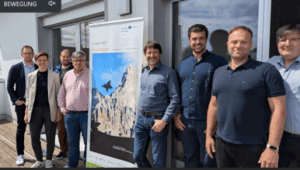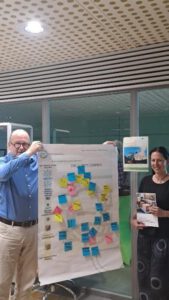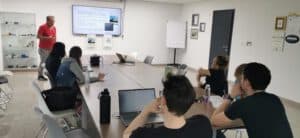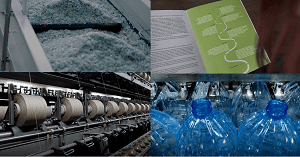The Cradle‑ALP project has ventured beyond theory to test the practical realities of circular economy adoption in the Alpine region. Through targeted pilot activities across five industrial sectors – packaging, textiles, polymers/composites, chemistry/materials, and wood/furniture – the project engaged small and medium-sized enterprises in real-life experimentation with cradle-to-cradle principles. This hands-on phase was critical not only for validating Cradle‑ALP’s roadmaps and tools, but also for identifying the key enablers and barriers that companies face in transitioning to circular value chains.
The piloting phase featured collective and individual activities designed to mentor SMEs, support technology adoption, and promote collaboration across borders. Tools such as the Circularity Compass, Sustainable Business Model Canvas (SBMC), QuickScan, Life Cycle Assessment (LCA) guide, and the Value Chain Generator were applied in real settings. These were complemented by events such as online and on-site matchmakings, Lego Serious Play innovation workshops, and direct company visits. Through these experiences, a series of lessons emerged that reflect both the promise and complexity of industrial circularity.
One major finding was the critical importance of inter-company collaboration across the value chain. For example, the Lego Serious Play workshop held in Linz, Austria, addressed challenges in sustainable plastic packaging. Participants agreed that circular transformation requires coordinated action among suppliers, producers, and downstream users – but identified poor communication as a major obstacle. Companies were often unaware of each other’s capabilities, making it difficult to align innovation efforts. The workshop emphasized the role of regional industry clusters and networks in bridging these gaps and enabling cooperation.
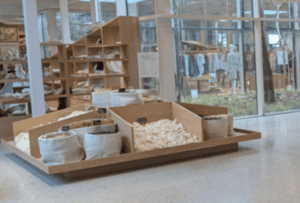
Regulatory complexity also surfaced repeatedly as a barrier. Participants reported difficulty navigating administrative processes when dealing with new circular technologies. There were concerns about the classification of by-products as waste and a perceived imbalance in incentives between circular and linear business models. The pilot findings suggest that circular pioneers are at a disadvantage due to regulatory uncertainty and limited support mechanisms, particularly in sectors like packaging and polymers.
At the same time, the pilot activities highlighted the value of facilitation and guided tool use. For instance, the LCA guide proved helpful for SMEs to understand life cycle impacts. However, its application required expert support, demonstrating that while tools are powerful, they need to be embedded in structured learning environments to be effective.
Pilot events also confirmed the value of peer learning and face-to-face engagement. During the “Composites Recycling in the Alpine Space” matchmaking event in March 2025, SMEs from all Alpine countries presented their solutions and built new connections. For example, French SME Polyloop used the platform to form a strategic link with IPC, leading to a joint carbon footprint study. Similarly, Plastic at Sea, a biodegradability testing firm, engaged in multiple B2B meetings and initiated technical collaboration with a Romanian institute. These real-world engagements gave SMEs visibility and credibility while laying the groundwork for future innovation.
Innovation was also encouraged through creative workshops like the “Fischer Serious Play” sessions in Germany. Here, young professionals used the SBMC and Lego Serious Play to ideate startup models for sustainable polymer applications. The initiative demonstrated that combining technical challenge-solving with storytelling and design thinking can activate new perspectives among emerging entrepreneurs.
Other lessons cantered on the role of legislation and knowledge-sharing. During the packaging sector matchmaking event in June 2025, companies expressed a need for clearer guidance on European environmental legislation. Presentations by legal experts and sustainability managers helped participants understand not only the regulatory landscape, but also how to align their strategies with future compliance requirements. This kind of structured knowledge transfer was seen as highly beneficial by the attending SMEs.
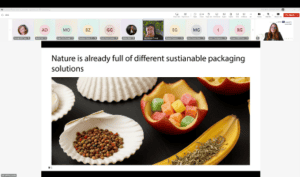
A similar insight emerged from the Slovenian pilot with a family-owned packaging company. Initially, the company’s Sales Director approached the workshop with skepticism. Yet, by the end of the session, she expressed regret that more of her colleagues hadn’t attended. Her shift in attitude illustrates a broader pattern noted throughout the pilot phase: when circularity is presented not as abstract theory but through tangible tools and practical dialogue, even reluctant participants become invested advocates.
The piloting activities also tested different outreach formats. The joint Cradle‑ALP booth at the CIRPLEX Circular Plastics Experience Summit in Austria gave eight SMEs a chance to exhibit, engage with partners, and join matchmakings under one umbrella. This format proved to be a cost-effective and high-impact way to connect circular innovators across the region.
In conclusion, the Cradle‑ALP pilot phase offered a robust and realistic look at what it takes to implement cradle-to-cradle strategies in the Alpine industrial ecosystem. The tools adopted by the consortium were only fully activated when used in structured, facilitated, and collaborative contexts. The pilot also revealed that regulatory uncertainty, communication barriers, and limited SME capacity remain real obstacles to circular innovation. However, the enthusiasm, creativity, and commitment shown by the participating companies also demonstrated that the Alpine region is ready to lead Europe in the transition toward a more circular and resilient industrial model.
